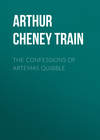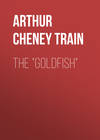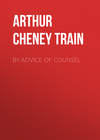Czytaj książkę: «Tutt and Mr. Tutt», strona 5
Mr. Tutt vainly tried to grasp the fact that he was in his own native city of New York. Long sleeves covered with red and purple dragons hid his arms and hands, and below the collar a smooth tight surface of silk across his breast made access to his pockets quite impossible. In one of them reposed twenty one-thousand-dollar bills—his fee for securing the acquittal of Mock Hen. Yes, he was in New York!
The monotonous wail of the instruments, the pungency of the incense, the subdued light, the humid breath of the roses carried the thoughts of Mr. Tutt far away. Before him, against the blue misty sunshine, rose the yellow temples of Peking. He could hear the faint tintinnabulation of bells. He was wandering in a garden fragrant with jasmine blossoms and adorned with ancient graven stones and carved gilt statues. The air was sweet. Mr. Tutt was very tired....
"Let him sleep!" nodded Buddha, deftly conveying to his wrinkled lips a delicate morsel of guy yemg dun. "Let him sleep! He has earned his sleep. He has saved our face!"
It was after midnight when Mr. Tutt, heavily laden with princely gifts of ivory and jade and boxes of priceless teas, emerged from the side door of the Shanghai and Hongkong American-Chinese Restaurant. The sky was brilliant with stars and the sidewalks of Doyers and Pell Streets were crowded with pedestrians. Near by a lantern-bedecked rubber-neck wagon was in process of unloading its cargo of seekers after the curious and unwholesome. On either side of him walked Wong Get and Buddha. They had hardly reached the corner when five shots echoed in quick succession above the noise of the traffic and the crowd turned with one accord and rushed in the direction from which he had just come.
Mr. Tutt, startled, stopped and looked back. Courteously also stopped Wong Get and Buddha. A throng was fast gathering in front of the Shanghai and Hongkong Restaurant.
Then Murtha appeared, shouldering his way roughly through the mob. Catching sight of Mr. Tutt, he paused long enough to whisper hoarsely in the lawyer's ear: "Well, they got Mock Hen! Five bullets in him! But if they were going to, why in hell couldn't they have done it three months ago?"
Samuel and Delilah
"And it came to pass, when she pressed him daily with her words, and urged him, so that his soul was vexed unto death; that he told her all his heart, and said unto her, There hath not come a razor upon mine head; … if I be shaven, then my strength will go from me, and I shall become weak and be like any other man."—JUDGES XVI, 16, 17.
"Have you seen '76 Fed.' anywhere, Mr. Tutt?" inquired Tutt, appearing suddenly in the doorway of his partner's office.
Mr. Tutt looked up from Page 364 of the opinion he was perusing in "The United States vs. One Hundred and Thirty-two Packages of Spirituous Liquors and Wines."
"Got it here in front of me," he answered shortly. "What do you want it for?"
Tutt looked over his shoulder.
"That's a grand name for a case, isn't it? 'Packages of Wines!'" he chuckled. "I made a note once of a matter entitled 'United States vs. Forty-three Cases of Frozen Eggs'; and of another called 'United States vs. One Feather Mattress and One Hundred and Fifty Pounds of Butter'—along in 197 Federal Reports, if I remember correctly. And you recall that accident case we had—Bump against the Railroad?"
"You can't tell me anything about names," remarked Mr. Tutt. "I once tried a divorce action. Fuss against Fuss; and another, Love against Love. Do you really want this book?"
"Not if you are using it," replied Tutt. "I just wanted to show an authority to Mr. Sorg, the president of the Fat and Skinny Club. You know our application for a certificate of incorporation was denied yesterday by Justice McAlpin."
"No, I didn't know it," returned Mr. Tutt. "Why?"
"Here's his memorandum in the Law Journal," answered his partner. "Read it for yourself":
Matter of Fat and Skinny Club, Inc. This is an application for approval of a certificate of incorporation as a membership corporation. The stated purposes are to promote and encourage social intercourse and good fellowship and to advance the interests of the community. The name selected is the Fat and Skinny Club. If this be the most appropriate name descriptive of its membership it is better that it remain unincorporated. Application denied.
"Now who says the law isn't the perfection of common sense?" ruminated Mr. Tutt. "Its general principles are magnificent."
"And yet," mused Tutt, "only last week Judge McAlpin granted the petition of one Solomon Swackhamer to change his name to Phillips Brooks Vanderbilt. Is that right? Is that justice? Is it equity? I ask you!—when he turns down the Fat and Skinnies?"
"Oh, yes it is," retorted Mr. Tutt. "When you consider that Mr. Swackhamer could have assumed the appellation of P.B. Vanderbilt or any other name he chose without asking the court's permission at all."
"What!" protested Tutt incredulously.
"That's the law," returned the senior partner. "A man can call himself what he chooses and change his name as often as he likes—so long, of course, as he doesn't do it to defraud. The mere fact that a statute likewise gives him the right to apply to the courts to accomplish the same result makes no difference."
"Of course it might make him feel a little more comfortable about it to do it that way," suggested Tutt. "Do you know, as long as I've practised law in this town I've always assumed that one had to get permission to change one's name."
"You've learned something," said Mr. Tutt suavely. "I hope you will put it to good account. Here's '76 Fed.' Take it out and console the Fat and Skinny Club with it if you can."
Mr. Tutt surrendered the volume without apparent regret and Tutt retired to his own office and to the task of soothing the injured feelings of Mr. Sorg.
A simple-minded little man was Tutt, for all his professional shrewdness and ingenuity. Like many a hero of the battlefield and of the bar, once inside the palings of his own fence he became modest, gentle, even timorous. For Abigail, his wife, had no illusions about him and did not affect to have any. To her neither Tutt nor Mr. Tutt was any such great shakes. Had Tutt dared to let her know of many of the schemes which he devised for the profit or safety of his clients she would have thought less of him still; in fact, she might have parted with him forever. In a sense Mrs. Tutt was an exacting woman. Though she somewhat reluctantly consented to view the hours from nine a.m. to five p.m. in her husband's day as belonging to the law, she emphatically regarded the rest of the twenty-four hours as belonging to her.
The law may be, as Judge Holmes has called it, "a jealous mistress," but in the case of Tutt it was not nearly so jealous as his wife. So Tutt was compelled to walk the straight-and-narrow path whether he liked it or not. On the whole he liked it well enough, but there were times—usually in the spring—when without being conscious of what was the matter with him he mourned his lost youth. For Tutt was only forty-eight and he had had a grandfather who had lived strenuously to upward of twice that age. He was vigorous, sprightly, bright-eyed and as hard as nails, even if somewhat resembling in his contours the late Mr. Pickwick. Mrs. Tutt was tall, spare, capable and sardonic. She made Tutt comfortable, but she no longer appealed to his sense of romance. Still she held him. As the playwright hath said "It isn't good looks they want, but good nature; if a warm welcome won't hold them, cold cream won't."
However, Tutt got neither looks nor cold cream. His welcome, in fact, was warm only if he stayed out too late, and then the later the warmer. His relationship to his wife was prosaic, respectful. In his heart of hearts he occasionally thought of her as exceedingly unattractive. In a word Mrs. Tutt performed her wifely functions in a purely matter-of-fact way. Anything else would have seemed to her unseemly. She dressed in a manner that would have been regarded as conservative even on Beacon Hill. She had no intention of making an old fool of herself or of letting him be one either. When people had been married thirty years they could take some things for granted. Few persons therefore had ever observed Mr. Tutt in the act of caressing Mrs. Tutt; and there were those who said that he never had. Frankly, she was a trifle forbidding: superficially not the sort of person to excite a great deal of sentiment; and occasionally, as we have hinted, in the spring Tutt yearned for a little sentiment.
He did his yearning, however, entirely on the side and within those hours consecrated to the law. In his wife's society he yearned not at all. In her company he carefully kept his thoughts and his language inside the innermost circle of decorum. At home his talk was entirely "Yea, yea," and "Nay, nay," and dealt principally with politics and the feminist movement, in which Abigail was deeply interested.
And by this we do not mean to suggest that at other times or places Tutt was anything but conventionally proper. He was not. He only yearned to be, well knowing that he was deficient in courage if not in everything else.
But habit or no habit, likely or unlikely, Mrs. Tutt had no intention of taking any chances so far as Tutt was concerned. If he did not reach home precisely at six explanations were in order, and if he came in half an hour later he had to demonstrate his integrity beyond a reasonable doubt according to the established rules of evidence.
Perhaps Mrs. Tutt did wisely to hold Tutt thus in leash considering the character of many of the firm's clients. For it was quite impossible to conceal the nature of the practise of Tutt & Tutt; much of which figured flamboyantly in the newspapers. Some women would have taken it for granted under like circumstances that their husbands had acquired a touch at least of the wisdom of the serpent even if they remained quite harmless. Abigail countenanced no thought of any demoralization in her spouse. To her he was like the artist who smears himself and his smock with paint while in his studio, but appears at dinner in spotless linen without even a whiff of benzine about him to suggest his occupation. So Tutt, though hand and glove in his office with the most notorious of the elite of Longacre Square, came home to supper with the naiveté and innocence of a theological student for whom an evening at a picture show is the height of dissipation.
Yet Tutt was no more of a Doctor Jekyll and Mr. Hyde than most of us. Merely, his daily transition was a little more abrupt. And when all is said and done most of the devices invented by his fertile little brain to further the interests of his clients were no more worthy of condemnation than those put forward by far higher-priced and much more celebrated attorneys.
Not that Mrs. Tutt was blind to the dangers to which her husband by virtue of his occupation was exposed. Far from it. Indeed she made it her business to pay periodical visits to the office, ostensibly to see whether or not it was properly cleaned and the windows washed, but in reality—or at least so Tutt suspected—to find out whether the personnel was entirely suitable for a firm of their standing and particularly for a junior partner of his susceptibilities.
But she never discovered anything to give her the slightest cause for alarm. The dramatis personae of the offices of Tutt & Tutt were characteristic of the firm, none of their employees—except Miss Sondheim, the tumultous-haired lady stenographer—and Willie, the office boy, being under forty years of age.
When not engaged in running errands or fussing over his postage-stamp album, Willie spent most of his time teasing old Scraggs, the scrivener, an unsuccessful teetotaler. A faint odor of alcohol emanated from the cage in which he performed his labors and lent an atmosphere of cheerfulness to what might otherwise have seemed to Broadway clients an unsympathetic environment, though there were long annual periods during which he was as sober as a Kansas judge. The winds of March were apt, however, to take hold of him. Perhaps it was the spring in his case also.
The backbone of the establishment was Miss Minerva Wiggin. In every law office there is usually some one person who keeps the shop going. Sometimes it is a man. If so, he is probably a sublimated stenographer or law clerk who, having worked for years to get himself admitted to the bar, finds, after achieving that ambition, that he has neither the ability nor the inclination to brave the struggle for a livelihood by himself. Perchance as a youth he has had visions of himself arguing test cases before the Court of Appeals while the leaders of the bar hung upon his every word, of an office crowded with millionaire clients and servile employees, even as he is servile to the man for whom he labors for a miserly ten dollars a week.
His ambition takes him by the hand and leads him to high places, from which he gazes down into the land of his future prosperity and greatness. The law seems a mysterious, alluring, fascinating profession, combining the romance of the drama with the gratifications of the intellect. He springs to answer his master's bell; he sits up until all hours running down citations and making extracts from opinions; he rushes to court and answers the calendar and sometimes carries the lawyer's brief case and attends him throughout a trial. Three years go by—five—and he finds that he is still doing the same thing. He is now a member of the bar, he has become the managing clerk, he attends to fairly important matters, engages the office force, superintends transfer of title, occasionally argues a motion. Five years more go by and perhaps his salary is raised a trifle more. Then one day he awakes to the realization that his future is to be only that of a trusted servitor.
Perchance he is married and has a baby. The time has come for him to choose whether he will go forth and put his fortune to the test "to win or lose it all" or settle down into the position of faithful legal hired man. He is getting a bit bald, he has had one or two tussles with his bank about accidental overdrafts. The world looks pretty bleak outside and the big machine of the law goes grinding on heartless, inevitable. Who is he to challenge the future? The old job is fairly easy; they can't get on without him, they say; here is where he belongs; he knows his business—give him his thirty-five hundred a year and let him stay!
That is Binks, or Calkins, or Shivers, or any one of those worried gray-haired men who sit in the outer office behind a desk strewn with papers and make sure that no mistakes have been made. To them every doubtful question of practise is referred and they answer instantly—sometimes wrongly, but always instantly. They know the last day for serving the demurrer in Bilbank against Terwilliger and whether or not you can tax a referee's fee as a disbursement in a bill of costs; they are experts on the precise form for orders in matrimonial actions and the rule in regard to filing a summons and complaint in Oneida County; they stand between the members of the firm and disagreeable clients; they hire and discharge the office boys; they do everything from writing a brief for the Supreme Court of the United States down to making the contract with the window cleaners; they are the only lawyers who really know anything and they were once promising young men, who have found out at last that life and the Sunday-school books are very far apart; but they run the works and make the law a gentleman's profession for the rest of us. They are always there. Others come, grow older, go away, but they remain. Many of them drink. All of which would be irrelevant, incompetent and immaterial if this were not a legal story.
Scraggs had been one of these, but he had also been one of those who drank, and now he was merely a bookkeeper. Miss Wiggin reigned in his stead.
A woman and not a man kept Tutt & Tutt on the map. When this sort of thing occurs it is usually because the woman in question is the ablest and very likely also the best person in the outfit, and she assumes the control of affairs by a process of natural selection. Miss Wiggin was the conscience, if Mr. Tutt was the heart, of Tutt & Tutt. Nobody, unless it was Mr. Tutt, knew where she had come from or why she was working if at all in only a semi-respectable law office. Without her something dreadful would have happened to the general morale. Everybody recognized that fact.
Her very appearance gave the place tone—neutralized the faint odor of alcohol from the cage. For in truth she was a fine-looking woman. Had she been costumed by a Fifth Avenue dressmaker and done her coiffure differently she would have been pretty. Because she drew her gray hair straight back from her low forehead and tied it in a knob on the back of her head, wore paper cuffs and a black dress, she looked nearer fifty than forty-one, which she was. Two hundred dollars would have taken twenty years off her apparent age—a year for every ten dollars; but she would not have looked a particle less a lady.
Her duties were ambiguous. She was always the first to arrive at the office and was the only person permitted to open the firm mail outside of its members. She overlooked the books that Scraggs kept and sent out the bills. She kept the key to the cash box and had charge of the safe. She made the entries in the docket and performed most of the duties of a regular managing clerk. She had been admitted to the bar. She checked up the charge accounts and on Saturdays paid off the office force. In addition to all these things she occasionally took a hand at a brief, drew most of the pleadings, and kept track of everything that was done in the various cases.
But her chief function, one which made her invaluable was that of receiving clients who came to the office, and in the first instance ascertaining just what their troubles were; and she was so sympathetic and at the same time so sensible that many a stranger who casually drifted in and would otherwise just as casually have drifted out again remained a permanent fixture in the firm's clientele. Scraggs and William adored her in spite of her being an utter enigma to them. She was quiet but businesslike, of few words but with a latent sense of humor that not infrequently broke through the surface of her gravity, and she proceeded upon the excellent postulate that everyone with whom she came in contact was actuated by the highest sense of honor. She acted as a spiritual tonic to both Mr. Tutt and Tutt—especially to the latter, who was the more in need of it. If they were ever tempted to stray across the line of professional rectitude her simple assumption that the thing couldn't be done usually settled the matter once and for all. On delicate questions Mr. Tutt frankly consulted her. Without her, Tutt & Tutt would have been shysters; with her they were almost respectable. She received a salary of three thousand dollars a year and earned double that amount, for she served where she loved and her first thought was of Tutt & Tutt. If you can get a woman like that to run your law office do not waste any time or consideration upon a man. Her price is indeed above rubies.
Yet even Miss Wiggin could not keep the shadow of the vernal equinox off the simple heart of the junior Tutt. She had seen it coming for several weeks, had scented danger in the way Tutt's childish eye had lingered upon Miss Sondheim's tumultous black hair and in the rather rakish, familiar way he had guided the ladies who came to get divorces out to the elevator. And then there swam into his life the beautiful Mrs. Allison, and for a time Tutt became not only hysterically young again, but—well, you shall see.
Yet, curiously enough, though we are a long way from where this story opened, it all goes back to Phillips Brooks Vanderbilt and the Fat and Skinny Club and the right to call ourselves by what names we please. Moreover, as must be apparent, all that happened occurred beyond Miss Wiggin's sphere of spiritual influence. Yet, had it not, even she could not have harnessed Leviathan or loosed the bands of Orion—to say nothing of counteracting the effect of spring.
When Tutt returned with "76 Fed." after the departure of Mr. Sorg he found his partner smoking the usual stogy and gazing pensively down upon the harbor. The immediate foreground was composed of rectangular roofs of divers colors, mostly reddish, ornamented with eccentrically shaped chimney pots, pent-houses, skylights and water tanks, in addition to various curious whistle-like protuberances from which white wraiths of steam whirled and danced in the gay breeze. Beyond, in the middle distance, a great highway of sparkling jewels led across the waves to the distant faintly green hills of Staten Island. Three tiny aeroplanes wove invisible threads against the blue woof of the sky above the New Jersey shore. It was not a day to practise law at all. It was a day to lie on one's back in the grass and watch the clouds or throw one's weight against the tugging helm of a racing sloop and bite the spindrift blown across her bows—not a day for lawyers but for lovers!
"Here's '76 Fed.'," said Tutt.
"What's become of Sorg?"
"Gone. Mad. Says the whole point of the Fat and Skinny Club is in the name."
"I fancy—from looking at Mr. Sorg—that that is quite true," remarked Mr. Tutt. He paused and reaching down into a lower compartment of his desk, lifted out a tumbler and his bottle of malt extract, which he placed carefully at his elbow and leaned back again contemplatively. "Look here, Tutt," he said. "I want to ask you something. Is there anything the matter with you?"
Tutt regarded him with the air of a small boy caught peeking through a knot hole.
"Why,—no!" he protested lamely. "That is—nothing in particular. I do feel a bit restless—sort of vaguely dissatisfied."
Mr. Tutt nodded sympathetically.
"How old are you, Tutt?"
"Forty-eight."
"And you feel just at present as if life were 'flat, stale and unprofitable?'"
"Why—yes; you might put it that way. The fact is every day seems just like every other day. I don't even get any pleasure out of eating. The very sight of a boiled egg beside my plate at breakfast gives me the willies. I can't eat boiled eggs any more. They sicken me!"
"Exactly!" Mr. Tutt poured out a glass of the malt extract.
"I feel the same way about a lot of things," Tutt hurried on. "Special demurrers, for instance. They bore me horribly. And supplementary proceedings get most frightfully upon my nerves."
"Exactly!" repeated Mr. Tutt.
"What do you mean by 'exactly?'" snapped Tutt.
"You're bored," explained his partner.
"Rather!" agreed Tutt. "Bored to death. Not with anything special, you understand; just everything. I feel as if I'd like to do something devilish."
"When a man feels like that he better go to a doctor," declared Mr. Tutt.
"A doctor!" exclaimed Tutt derisively. "What good would a doctor do me?"
"He might keep you from getting into trouble."
"Oh, you needn't be alarmed. I won't get into any trouble."
"It's the dangerous age," said Mr. Tutt. "I've known a lot of respectable married men to do the most surprising things round fifty."
Tutt looked interested.
"Have you now?" he inquired. "Well, I've no doubt it did some of 'em a world of good. Tell you frankly sometimes I feel as if I'd rather like to take a bit of a fling myself!"
"Your professional experience ought to be enough to warn you of the dangers of that sort of experiment," answered Mr. Tutt gravely. "It's bad enough when it occurs inadvertently, so to speak, but when a man in your condition of life deliberately goes out to invite trouble it's a sad, sad spectacle."
"Do you mean to imply that I'm not able to take care of myself?" demanded Tutt.
"I mean to imply that no man is too wise to be made a fool of by some woman."
"That every Samson has his Delilah?"
"If you want to put it that way—yes."
"And that in the end he'll get his hair cut?"
Mr. Tutt took a sip from the tumbler of malt and relit his stogy.
"What do you know about Samson and Delilah, Tutt?" he challenged.
"Oh, about as much as you do, I guess, Mr. Tutt," answered his partner modestly.
"Well, who cut Samson's hair?" demanded the senior member.
He emptied the dregs of the malt-extract bottle into his glass and holding it to the light examined it critically.
"Delilah, of course!" ejaculated Tutt.
Mr. Tutt shook his head.
"There you go off at half-cock again, Tutt!" he retorted whimsically. "You wrong her. She did no such thing."
"Why, I'll bet you a hundred dollars on it!" cried Tutt excitedly.
"Make it a simple dinner at the Claridge Grill and I'll go you."
"Done!"
There were four books on the desk near Mr. Tutt's right hand—the New York Code of Civil Procedure, an almanac, a Shakesperean concordance and a Bible.
"Look it up for yourself," said Mr. Tutt, waving his arm with a gesture of the utmost impartiality. "That is, if you happen to know in what part of Holy Writ said Delilah is to be found."
Tutt followed the gesture and sat down at the opposite side of the desk.
"There!" he exclaimed, after fumbling over the leaves for several minutes. "What did I tell you? Listen, Mr. Tutt! It's in the sixteenth chapter of Judges: 'And it came to pass, when she pressed him daily with her words, and urged him, so that his soul was vexed unto death; That he told her all his heart, and said unto her, There hath not come a razor upon mine head.' Um—um."
"Read on, Tutt!" ordered Mr. Tutt.
"Um. 'And when Delilah saw that he had told her all his heart, she sent and called for the lords of the Philistines, saying, Come up this once.' Um-um."
"Yes, go on!"
"'And she made him sleep upon her knees; and she called for a man, and she caused him to shave off the seven locks of his head.' Well, I'll be hanged!" exclaimed Tutt. "Now, I would have staked a thousand dollars on it. But look here, you don't win! Delilah did cut Samson's hair—through her agent. 'Qui facit per alium facit per se!'"
"Your point is overruled," said Mr. Tutt. "A barber cut Samson's hair. Let it be a lesson to you never to take anything on hearsay. Always look up your authorities yourself. Moreover"—and he looked severely at Tutt—"the cerebral fluid—like malt extract—tends to become cloudy with age."
"Well, anyhow, I'm no Samson," protested Tutt. "And I haven't met anyone that looked like a Delilah. I guess after the procession of adventuresses that have trailed through this office in the last twenty years I'm reasonably safe."
"No man is safe," meditated Mr. Tutt. "For the reason that no man knows the power of expansion of his heart. He thinks it's reached its limit—and then he finds to his horror or his delight that it hasn't. To put it another way, a man's capacity to love may be likened to a thermometer. At twenty-five or thirty he meets some young person, falls in love with her, thinks his amatory thermometer has reached the boiling-point and accordingly marries her. In point of fact it hasn't—it's only marking summer heat—hasn't even registered the temperature of the blood. Well, he goes merrily on life's way and some fine day another lady breezes by, and this safe and sane citizen, who supposes his capacity for affection was reached in early youth, suddenly discovers to his amazement that his mercury is on the jump and presently that his old thermometer has blown its top off."
"Very interesting, Mr. Tutt," observed Tutt after a moment's silence. "You seem to have made something of a study of these things."
"Only in a business way—only in a business way!" Mr. Tutt assured him. "Now, if you're feeling stale—and we all are apt to get that way this time of year—why don't you take a run down to Atlantic City?"
Now Tutt would have liked to go to Atlantic City could he have gone by himself, but the idea of taking Abigail along robbed the idea of its attraction. She had got more than ever on his nerves of late. But his reply, whatever it might have been, was interrupted by the announcement of Miss Wiggin, who entered at that moment, that a lady wished to see him.
"She asked for Mr. Tutt," explained Minerva.
"But I think her case is more in your line," and she nodded to Tutt.
"Good looking?" inquired Tutt roguishly.
"Very," returned Miss Wiggin. "A blonde."
"Thanks," answered Tutt, smoothing his hair; "I'm on my way."
Now this free, almost vulgar manner of speech was in reality foreign to both Tutt and Miss Wiggin and it was born of the instant, due doubtless to some peculiar juxtaposition of astral bodies in Cupid's horoscope unknown to them, but which none the less had its influence. Strange things happen on the eve of St. Agnes and on Midsummer Night—even in law offices.
Mrs. Allison was sitting by the window in Tutt's office when he came in, and for a full minute he paused upon the threshold while she pretended she did not know that he was there. The deluge of sunlight that fell upon her face betrayed no crack or wrinkle—no flaw of any kind—in the white marble of its perfection. It was indeed a lovely face, classic in the chiseling of its transparent alabaster; and when she turned, her eyes were like misty lakes of blue. Bar none, she was the most beautiful creature—and there had been many—that had ever wandered into the offices of Tutt & Tutt. He sought for a word. "Wonderful"; that was, it, she was "wonderful." His stale spirit soared in ecstasy, and left him tongue-tied. In vulgar parlance he was rattled to death, this commonplace little lawyer who for a score of years had dealt cynically with the loves and lives of the flock of female butterflies who fluttered annually in and out of the office. Throughout that period he had sat unemotionally behind his desk and listened in an aloof, cold, professional manner to the stories of their wrongs as they sobbed or hissed them forth. Wise little lawyer that he was, he had regarded them all as just what they were and nothing else—specimens of the Cecropia. And he had not even patted them upon the shoulder or squeezed their hands when he had bade them good-by—maintaining always an impersonal and dignified demeanor.

















